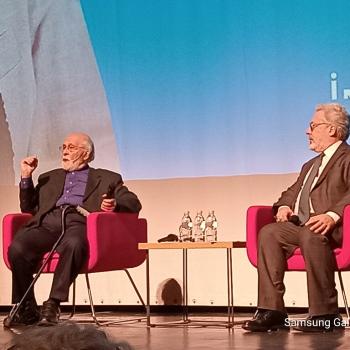
To study the teachings of the faith can be a good thing, but to live out those teachings is better. To memorize and know doctrine can be a good thing, but to judge others and browbeat them for not knowing obscure teachings of the faith is not. Doctrine is meant to show us the way to the fullness of the truth. We must not confuse our ability to argue with and debate others about doctrine as being sufficient to produce faith in others. The goal of the Christian life is not to know more and to be able to defend more propositions than others; rather, it is to know the truth which is beyond all such propositions and to live out the dictates of that truth so that others can see it at work in us. This is not done by debate. This is not done by study. If we think knowledge is enough, and if we show it off to others, we will fail to obtain the objectives which we seek. We cannot badger people into the faith. This is what so many involved with apologetics do not understand; someone can know the propositions of the faith; they can know all the arguments offered in favor of those propositions, but those arguments will never be enough because what is needed is not just the conventions of the faith but the actual experience of grace.
Argument and debate have little to no room for grace, especially if those who engage such fiascos do so because they are interested in showing off and looking great in front of others. Indeed, when pride and vainglory are combined with an argumentative attitude, those engaging apologetics will find their work only impresses themselves and those who think like them, while those who they should be reaching out and convincing will likely be pushed further away from the faith. If apologists become aggressive and rude when their arguments do not persuade their audience, that will only make things worse. They will convince people to stay away from them and what they have to say. Sadly, few apologists with that mentality understand what is going on; instead of changing their ways, they double-down on their aggression, becoming more and more vindicative, causing that much more reason for people to reject them and what they have to say. Instead of trying to lift others up and embrace them with love, which can and will help people attain or maintain faith, they seek to destroy the very people they once claimed they wanted to help. This, alas, is not an isolated problem; it is a common situation surrounding the so-called apologetics industry. It appears many of them think those who reject their arguments and want nothing to do with them must be wicked; why else would someone deny what they believe is so obvious? Surely, from this follows the sentiment that says if someone is wicked, and will not repent of their evil, they must be punished, and if punishment is not enough, they must be stopped by any and all means necessary.
While many so-called apologists would not like to admit it, indeed, they will deny this is what is going on, this is what we see happening time and time again. Their actions speak louder than words. Their cold-hearted ways explains why, even in the midst of all their logic and the arguments they use which favor for certain doctrinal teachings, there is no love manifest in what they have to say, which means, they have denied the grace needed to perfect their words and render them effective. And it becomes very clear that they lack such grace when they turn away from arguments and turn to outright cruelty. Despite all of this, they still might possess some kernel of grace in them, some honest zeal for the faith; if so, God can work in and with them to change them, to make them better, to make them realize the error of their ways; if this happens, then their knowledge can be put to use, and grace can begin manifest itself in them as they change their ways and treat others with charity and respect. Paul, after all, once was like such apologists; he thought his knowledge and study made him superior to others, and it was in and through his own pride he originally became antagonist towards Christians, persecuting them when they would not heed his arguments: “For you have heard of my former life in Judaism, how I persecuted the church of God violently and tried to destroy it; and I advanced in Judaism beyond many of my own age among my people, so extremely zealous was I for the traditions of my fathers” (Gal. 1:13-14 RSV).
Paul, despite his pride, still held a passion for God and a zeal for the faith. Nonetheless, for quite some time, his pride got the best of him; it encouraged him to take his accomplishments, such as his studies, as proving his superiority over others. Yet, despite such pride, he still had a desire for God and a zeal to know the truth. That core was used by God, it was what allowed him to be converted; God, with grace, embraced that kernel found in Paul and used it to lead him to understand that all his conjectures and knowledge was far less than the fullness of the truth itself. He had to come to realize the greater truth and that the means to realize that greater truth came from grace, and not from argumentation, nor from threats of violence. Paul became a great preacher of the faith when he realized this; when his mission was one of grace, he could and would share the grace he accepted and changed him; he could help others experience grace and with it the presence of God in their lives. For it is in that presence faith grows, as through it, one can learn truths which can never be spoken, truths which could not be properly expounded upon through any form of argumentation.
Apologetics has a place in the Christian faith. It should not be about making converts through argumentation, for that is not how true conversion is established. Those who engage apologetics should help those who come to them with questions, those who come to them and want to understand what they believe. For apologetics to be effective, it must be done out of love, not vainglory. Apologists should speak and act in as much charity as possible, for that charity, more than their words, will help their audience and lead them to the truth contained in the faith. Apologists, moreover, do have a role in correcting mistaken views others might have of the faith, but again, those who feel apologetics is their calling must correct others, not through insults and abuse, but with patience. Their work is to build others up, not tear them down. Love, not abuse, covers a multitude of sins. Those who expose the sins of others as a part of their apologetical work has misunderstood what apologetics is about, indeed, they might not know what the Christian faith is really about. For they should be in the world, continuing the work of Christ; Jesus did not go around arguing theology for the sake of showing himself superior to others, but rather, he went around helping those in need. He was recognized in the midst of his work more than he was in his theological discussions. Thus, when he brought back to life the only son of a widow, the people in the city of Nain were able to realize that God was at work and had been in their midst (cf. Lk. 7:11-16), and so should apologists do works of love and charity so that others can come to the faith when they reveal the work of God in their midst.
Stay in touch! Like A Little Bit of Nothing on Facebook.
If you liked what you read, please consider sharing it with your friends and family!












